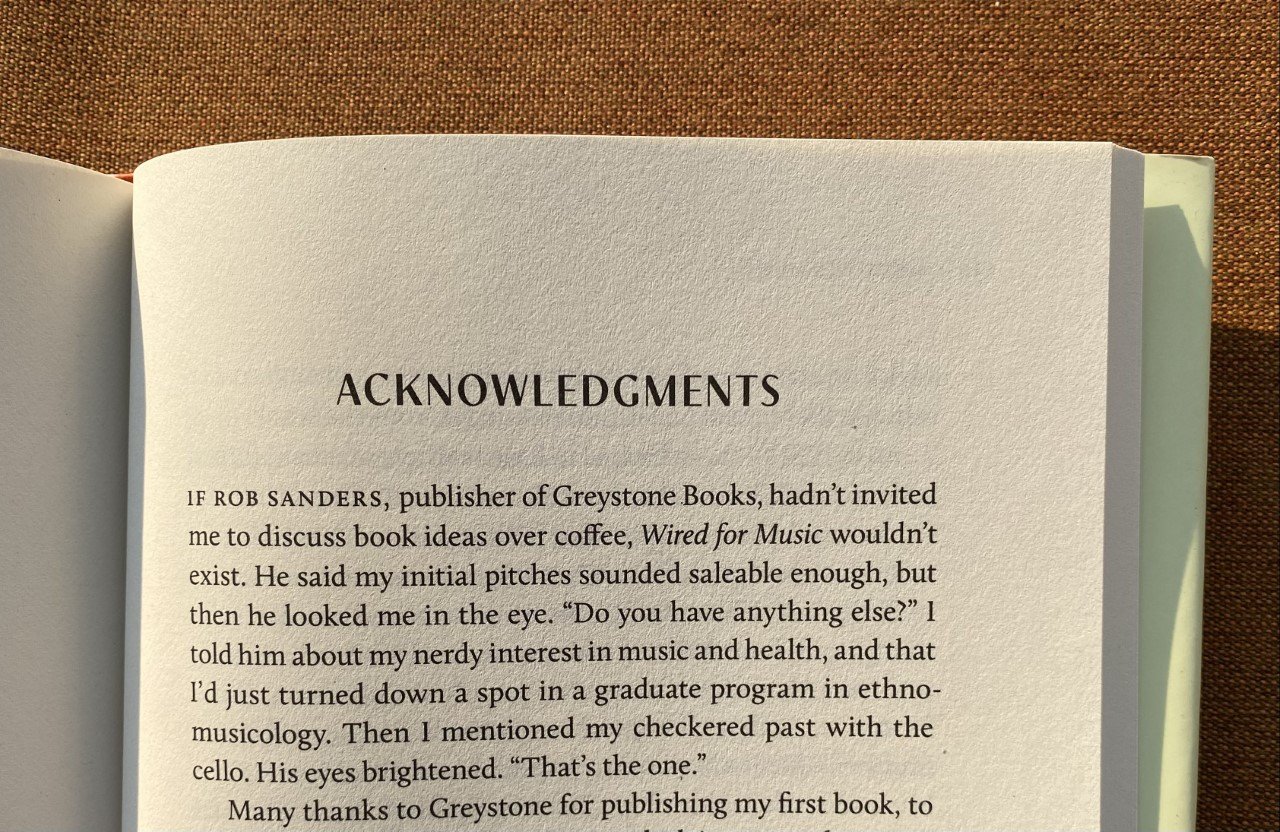“Thanks for mentioning me in your acknowledgments!” a friend said recently, before sheepishly admitting she hadn’t started reading my book. Did I mind? No! I often read the acknowledgments first—even if I don’t know the writer personally.
Acknowledgments offer behind-the-scenes glimpses of the writing life. As a first-time author, I’ve learned a lot from the list of thank-yous at the back of a book (including how to write them).
More than 80 names appear in the thank-yous at the back of my book “Wired for Music”—and I wish I’d included more.
From glib one-pagers to thank-the-Oscar-committee laundry lists, acknowledgements speak volumes about the author, their writing process and how the book came to be.
These pages may reveal:
Names of literary agents
How a magazine article turned into a full-length manuscript
The editor at the publishing house who took a chance on the book
Mentors, writing groups and book coaches who helped with the writing craft
Funding sources from foundations and grant institutions, and names of writers’ retreats
How the author approached book research and structure
The friends and family who cooked meals and did laundry so the author could write
Most of all, acknowledgments shed light on the tremendous effort and sheer volume of people involved in the gestation and birth of a book.
The thank-yous in my new book Wired for Music fill two-and-a-half pages—and I still didn’t fit everyone in:
ACKNOWLEDGMENTS
If Rob Sanders, publisher of Greystone Books, hadn’t invited me to discuss book ideas over coffee, Wired for Music wouldn’t exist. He said my initial pitches sounded saleable enough, but then he looked me in the eye. “Do you have anything else?” I told him about my nerdy interest in music and health, and that I’d just turned down a spot in a graduate program in ethnomusicology. Then I mentioned my checkered past with the cello. His eyes brightened. “That’s the one.”
Many thanks to Greystone for publishing my first book, to editor Lucy Kenward for her structural advice, copy editor Erin Parker for her lovely manner, and editorial director Jennifer Croll, proofreader Jennifer Stewart, and text designer Belle Wuthrich for going above and beyond in the final stages.
Credit also goes to my agent extraordinaire, Martha Webb, for believing in this book through its many detours.
I am extremely grateful for friends and mentors who gave crucial feedback along the way: Angie Abdou, Dominic Ali, Susie Berg, Galya Chatterton, Sylvia Coleman, Elee Kraljii Gardiner, James Glave, Sarah Hampson, Jane Henry, Jillian Horton, Caitlin Kelly, Carol Murray, Susan Olding, Sue Robins, Gary Ross, Amy Kiara Ruth, Eric Unmacht, and Jennifer Van Evra. I owe you big-time.
Colleagues at The Globe and Mail taught me a great deal about writing and science journalism. In particular, Dakshana Bascaramurty, Zosia Bielski, Ian Brown, Wency Leung, Hayley Mick, Chris Nuttall-Smith, Paul Taylor, and Carol Toller. Sinclair Stewart approved my leave for a family gap year (sorry for taking a buyout at the end!) and Jana Pruden gave me excellent advice on structure. Early in this book project, a pivotal conversation with Marsha Lederman rescued it from the brink.
All my life I’ve been blessed to have teachers of music, formal and informal. Special thanks to Navaro Franco, David Hutchenreuther, and Alexandra Jai. A big “Obrigada!” to Kleber Magrão and other members of Brazil’s mangue scene. And as they say in Zimbabwe, “Tatenda!” to the musicians and scholars who shared their knowledge of mbira music and Chivanhu culture with me: Musekiwa Chingodza, Jonathan Goredema, Kurai Mubaiwa, Ambuya Mugwagwa, Fradreck Mujuru, Patience Munjeri, Chiedza Mutamba, Florence Mutamba, Moyo Rainos Mutamba, Alois Mutinhiri, Caution Shonhai, Joyce Warikandwa, and the lovely people at Ubuntu Learning Village. Much appreciation, too, to Erica Azim of mbira.org and Jennifer Kyker at Eastman School of Music.
As a layperson, I couldn’t have written this book without the many researchers and scientists who agreed to speak with me or review technical passages, including Bernd Brabec de Mori, University of Innsbruck; Wade Davis, National Geographic Society; Jessica Grahn, Western University; Ethan Hein, New York University; Henkjan Honing, University of Amsterdam; Mendel Kaelan, Wavepaths; Costas Karageorghis, Brunel University London; Anton Killin, Australian National University; Kevin Kirkland, Capilano University; Samuel Mehr, Harvard University; Moyo Rainos Mutamba, Ubuntu Learning Village; Andrew Newberg, Thomas Jefferson University; David J. Rothenberg, Case Western Reserve University; Michael Thaut, University of Toronto; Laurel Trainor, McMaster University; and Robert Zatorre, Montreal Neurological Institute and McGill University. (Any errors are entirely my own.)
I can’t imagine finishing a book without friends and family to commiserate with and celebrate small victories. Eternal gratitude to Ksenia Barton, Marta Becker, Galya Chatterton, Sylvia Coleman, Emily Corse, Sandrine de Finney, Jennifer Van Evra, Hal Wake, Adele Weder, and many others.
At the sentence-by-sentence level, though, no one helped more than my empathic book coach turned dear friend, Marial Shea. From the proposal stage to manuscript delivery, she was like a mother to the writer in me. (If anyone needs handholding through the writing process, hire her!)
To my way-cooler-than-me parents, Susan Feindel and Russell Barton, thank you for setting the course for an unconventional life—and for never reproaching me for quitting the cello. Your acceptance helped me heal.
To my beloved husband and son, I know it wasn’t easy living with my frazzled side in the final months of this writing project. Scott, you have supported me in every possible way, from paying the bills when I left my Globe job to believing in me when I couldn’t. I cherish you and all the joys you have brought to my life.
Finally, a big thank-you to every stranger who said they’d like to read a book like mine, from a distinguished music critic to a waiter at the Keg. Every reader is a gift.
